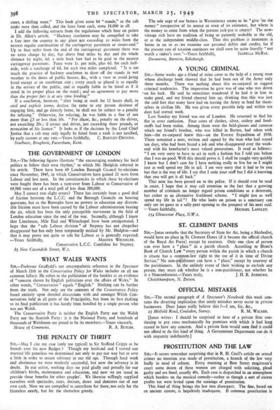A YOUNG CRIMINAL
SIR,—Some weeks ago a friend of mine came to the help of a young man whose discharge book showed that he had been out of the Army only three months. There was nothing about this ex-corporal to suggest criminal tendencies. The impression he gave was of one who was down *on his luck. He said he sometimes wondered if he had it in him to make good, and my friend cheered him up, thinking that this was just the cold feet that many have had on leaving the Army to fend for them- sehres in civilian life. He was given every, possible help and within ten days had started work.
Last Sunday my friend was out of London. He returned to find his flat in utter confusion. Four cases of clothes, silver, cutlery and food- stuffs had been stolen. Among them were the field-glasses and cameras which my friend's brother, who was killed in Burma, had taken with him—the ex-corporal knew this—on the Everest Expedition of 1938. There remained a note, written and signed by the man who had stayed ten days, who had been found a job and who disappeared over the week- end with his benefactor's most valued possessions. It read as follows: " I am very sorry to have to act in such a fashion but I told you before that I was no good. Well this should prove it I shall be caught very quickly I know but I don't care for I have nothing really to live for so I might just as well spend my life in jail. I am very sorry that it had to be you but that is the way of life. I say that I stole your stuff but I did it knowing that you will get it all bads."
That note has been passed on to the police. If it should ever be read in court, I hope that it may call attention to the fact that a growing number of criminals no longer regard prison conditions as a deterrent, but rather as an alternative livelihood scheme. " I might just as well spend my life in jail "! He who looks on prison as a sanctuary can only see its gates as a sally-port opening to the prospect of his next raid.














































 Previous page
Previous page